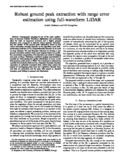Robust ground peak extraction with range error estimation using full-waveform LiDAR
| dc.contributor.author | Jalobeanu, Andre | |
| dc.contributor.author | Goncalves, Gil | |
| dc.date.accessioned | 2014-06-09T23:15:28Z | |
| dc.date.available | 2014-06-09T23:15:28Z | |
| dc.date.issued | 2014 | |
| dc.identifier.citation | IEEE Geoscience & Remote Sensing Letters | |
| dc.identifier.uri | https://hdl.handle.net/10945/42160 | |
| dc.description.abstract | Topographic mapping is one of the main applications of airborne LiDAR. Waveform digitization and processing allow for both an improved accuracy and a higher ground detection rate compared to discrete return systems. Nevertheless, the quality of the ground peak estimation, based on last return extraction, strongly depends on the algorithm used. Bestperforming methods are too computationally intensive to be used on large datasets. We used Bayesian inference to develop a new ground extraction method whose most original feature is predictive uncertainty computation. It is also fast, and robust to ringing and peak overlaps. Obtaining consistent ranging uncertainties is essential for determining the spatial distribution of error on the final product, point cloud or DEM. The robustness is achieved by a partial deconvolution followed by a Bayesian Gaussian function regression on optimally truncated data, which helps reduce the impact of overlapping peaks from low vegetation. Results from real data are presented, and the gain with respect to classical Gaussian peak fitting is assessed and illustrated. | en_US |
| dc.rights | This publication is a work of the U.S. Government as defined in Title 17, United States Code, Section 101. Copyright protection is not available for this work in the United States. | en_US |
| dc.title | Robust ground peak extraction with range error estimation using full-waveform LiDAR | en_US |
| dc.type | Article | en_US |


